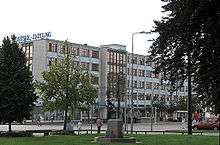Ostsee-Zeitung
| Type | Daily newspaper |
|---|---|
| Format | Rheinisch |
| Owner(s) | Lübecker Nachrichten GmbH |
| Publisher | Ostsee-Zeitung publishing house |
| Founded | 1952 |
| Language | German |
| Headquarters | Rostock |
| Website | OZ |
Ostsee-Zeitung (also known as OZ) is a German language regional daily newspaper published in Rostock, Germany.
Profile

Founded in 1952,[1] Ostsee-Zeitung was one of the newspapers published in East Germany before German reunification.[2][3] The paper was owned the Socialist Unity Party during this period.[2][4] It is based in Rostock[5][6] and is published in Rheinisch format.[7]
Ostsee-Zeitung was part of the Ostsee-Zeitung GmbH, a subsidiary of the Axel Springer group, until 2008.[2][8] The group acquired the shares in the paper in 1990.[9] The Lübecker Nachrichten GmbH, a subsidiary of the Madsack group, bought the Ostsee-Zeitung GmbH in February 2009.[2][10] The Ostsee-Zeitung GmbH is now a subsidiary of the Lübecker Nachrichten GmbH.[11] The Madsack group also owns Freie Presse, Göttinger Tageblatt, Hannoversche Allgemeine Zeitung, Kieler Nachrichten, Leipziger Volkszeitung, and Lübecker Nachrichten.[12]
The publisher of Ostsee-Zeitung is the Ostsee Zeitung publishing house.[5] The paper has ten local editions.[8][10]
Ostsee-Zeitung is regarded as part of the regional identity of Mecklenburg-Vorpommern.[13]
Circulation
The circulation of Ostsee-Zeitung was 232,100 copies in the mid-1990s before the unification.[3] In 2001 the paper had a circulation of 191,000 copies.[7] Its circulation was 181,046 copies in the second quarter of 2003.[14]
References
- ↑ "Ostsee-Zeitung". University of Wisconsin-Madison Libraries. Retrieved 18 April 2015.
- 1 2 3 4 Andrea Czepek; Ulrike Klinger (2010). "Media Pluralism Between Market Mechanisms and Control: The German Divide" (PDF). International Journal of Communication. 4: 820–843. Retrieved 7 February 2015.
- 1 2 Pierre Musso; Philippe Souêtre; Lionel Levasseur (1995). The Printed Press and Television in the Regions of Europe. Council of Europe. p. 86. ISBN 978-92-871-2807-2. Retrieved 7 February 2015.
- ↑ Duncan Smith (1988). Walls and Mirrors: Western Representations of Really Existing German Socialism in the German Democratic Republic. University Press of America. p. 20. ISBN 978-0-8191-6710-1. Retrieved 19 April 2015.
- 1 2 "New façade for Ostsee Zeitung newspaper publishing house in Rostock/Germany". Inros Lackner. Retrieved 7 February 2015.
- ↑ Anthony Weymouth; Bernard Lamizet (3 June 2014). Markets and Myths: Forces For Change In the European Media. Taylor & Francis. p. 206. ISBN 978-1-317-88969-4. Retrieved 12 April 2015.
- 1 2 Adam Smith (15 November 2002). "Europe's Top Papers". campaign. Retrieved 7 February 2015.
- 1 2 "Triple-width newspaper presses also on the advance in Germany". König and Bauer. 17 May 2005. Retrieved 7 February 2015.
- ↑ "Axel Springer Group: landmarks". Ketupa. Retrieved 7 February 2015.
- 1 2 Michael Spinner-Just (26 September 2011). "Ostsee-Zeitung stays on course in the mailroom". WAN IFRA. Retrieved 7 February 2015.
- ↑ "Ost-see Zeitung GmbH". Bloomberg Business. Retrieved 19 April 2015.
- ↑ Martin Pelzl (14 November 2010). "Leipzig? Never heard of it!". Goethe Institute. Retrieved 7 February 2015.
- ↑ Friedrich Ungerer (1 January 2000). English Media Texts, Past and Present: Language and Textual Structure. John Benjamins Publishing. p. 68. ISBN 90-272-5099-5. Retrieved 7 February 2015.
- ↑ David Ward (2004). "A mapping study of media concentration and ownership in ten European countries" (PDF). Commissariaat voor de Media. Hilversum. Retrieved 7 February 2015.